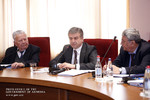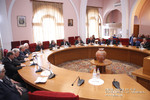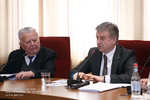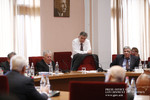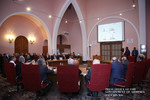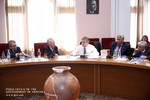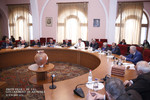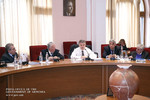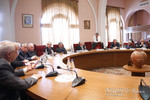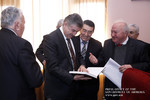Friday, 9 December 2016
Karen Karapetyan: “The State shall support output-generating academic institutions”
Prime Minister Karen Karapetyan visited today the National Academy of Sciences of Armenia to meet with the heads of scientific organizations and discuss the problems and solutions in the field of science.
The Prime Minister suggested focusing on the following thesis and idea: what should be done to raise the scientists’ living standards. “If we carry on like this, we will not be able to live well. I would like to emphasize this idea as we talk about how to build the Government-Academy of Sciences relations in order to develop science. First, scientists need to be provided a dignified life; second, scientists should create added value in the GDP; third, they must develop criteria to evaluate themselves,” Karen Karapetyan pointed out.
RA NAS President Radik Martirosyan presented the objectives, activities and programs for scientific organizations, ways of optimizing research, developing human resources, international cooperation and establishing relations between scientists.
The NAS President highlighted domestic organizations’ involvement in Horizon 2020 and other international research projects. He noted that according to international estimates, among the 10 countries of the Black Sea Basin only Armenia and Turkey were able to redouble their scientific results in 2016.
Highlighting the need to enhance the effectiveness of science, Radik Martirosyan said that a system of evaluation of research groups’ activity has already been developed and will be introduced in the coming year, based on which the volume of assistance to be provided to scientific organizations shall be determined.
At the same time, the NAS President noted that young scientists keep leaving scientific organizations for the private sector or foreign countries.
Prime Minister Karapetyan attached importance to the assessment criteria for the definition of non-budgetary revenues resulting from the increase in international activities and the output of scientific institutions.
“We must understand what is going wrong. If our conversation results in that the government gives little money, then we will not come to practical conclusions,” the Premier said adding that the State is going to support Armenian studies and other related disciplines, which cannot give practical results. He proposed to discuss the activities of those institutions that can provide practical results and asked whether the NAS has set such a task before scientific organizations; whether there are researchers in search of markets, whether business has signed contracts with science and, finally, what are the steps to take to ensure that business gives orders to science.
Then the heads of scientific institutions presented their activities, problems relating to legislative gaps, procurements, and the possible increase in the volume of extra-budgetary funding and came up with specific proposals. In particular, Director of Armbiotechnology Research and Production Center Ashot Saghyan said that they are producing environmentally friendly bio-fertilizers, which can well substitute the nitrogen fertilizer in agriculture to ensure high result, but the State keeps importing the fertilizer from abroad through private entities.
The Prime Minister suggested discussing the matter with the heads of relevant government departments. In this context, Karen Karapetyan emphasized that if the product proves effective and profitable, the Government will switch over the order to domestic manufacturers.
Director of Radio Physics and Electronics Institute Arsen Hakhumyan said they were exporting their output to 12 countries, but there is problem associated with patents, marketing and market research.
The Prime Minister told him to clearly formulate the proposal and its rationale and went on to stress that all successful and logical proposals will be supported. “I would like to see the difference between successful and output-generating and inefficient domestic institutions,” Karen Karapetyan pointed out. Coming to the remuneration of best researchers in order to prevent them from leaving the country, the Prime Minister suggested considering the possibility of involving the private sector in this process.
“You need to formulate the idea for a specific organization, which will become a partner and a client at the same time. This way they will take on the costs related to the research knowing that five years later they will be on the winning side. It is up to the manufacturer or the producer to find a client for their product. You want the customer to be sensitive to your needs. This is not the way things are being done in the world. The seller of a product or service is the one to be active on the market. I specifically want to speak the language of business. You need to work more closely with the business; you need to have a fellow researcher responsible for marketing and sales, who will understand the practical effect of your product and try to sell it,” the Prime Minister noted.
Director of the Institute of Archaeology and Ethnography Pavel Avetisyan said to be ready to develop tourism projects for the realization of the cultural and historical potential of Armenia eligible for State order.
“I want to place the State order for such products as may have applied effect in the future. History is one of our key assets. Identify the products that can be eligible for advertising. For instance, I know that Shengavit (an archaeological site) is six thousand years old, and I do not think that there are many cities in the world older than Shengavit. We have not advertised it so far. It should be served as a product,” the Prime Minister added.
Karen Karapetyan stressed that he was ready to provide all necessary platforms for the researchers to get their say through to the relevant authorities.
“We have only one option left. We will be moving ahead step by step so that all those institutions even theoretically able to give applicable output might work at it, and we will back you as much as possible in this matter. This is the only way to succeed,” Karen Karapetyan concluded.







